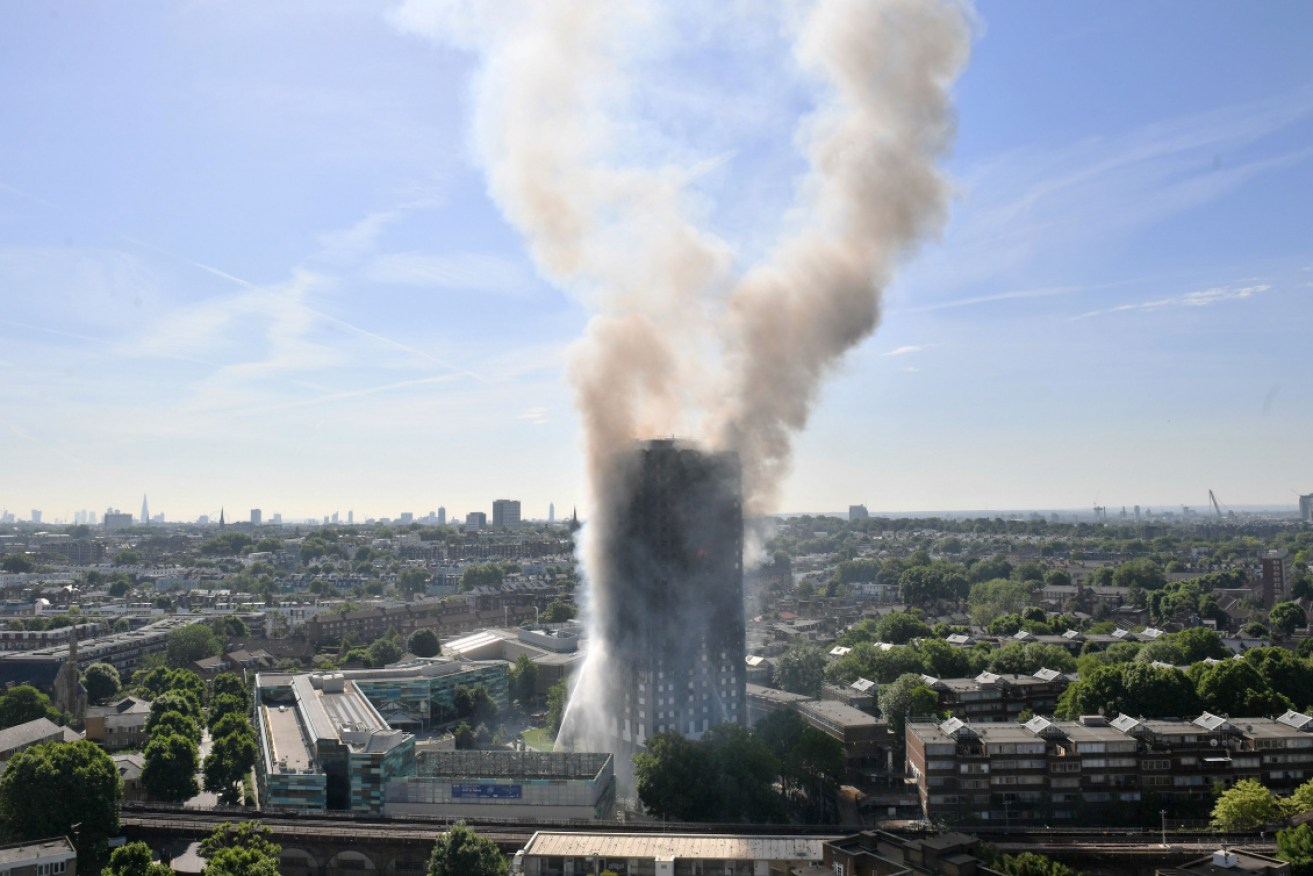Certification agency that signed off on dodgy cladding has been suspended


The 2017 Grenfell tower fire in London caused 72 deaths, and led to widespread international concerns about flammable cladding. Photo: AAP
The certification agency that signs off on the majority of Australia’s building products has been temporarily suspended – and a company note to clients shows the suspension is related to combustible cladding.
CertMark International (CMI) – which is the principal agency used by the Australian Building Codes Board (ABCB) to determine whether building products are compliant – announced on July 11 that it had been suspended for 60 days by the Joint Accreditation System of Australia and New Zealand (JAS-ANZ) for failing to meet the CodeMark product certification scheme’s accreditation requirements.
The suspension calls into question the credibility of past certificates issued by CMI, which could have major ramifications for the industry, according to Builders Collective of Australia president Phil Dwyer.
Mr Dwyer provided The New Daily with a list of 49 external cladding and fire-rated systems certified by CMI, and said CMI issued approximately 65 per cent of all product certificates issued under the CodeMark scheme.
He told The New Daily that JAS-ANZ didn’t take the decision to issue a suspension lightly.
“Companies don’t get suspended unless there’s good reason to do so,” he told The New Daily.
“It’s a big story, because they are the people who certified the flammable cladding panels.”

CMI mentioned combustible cladding in an update to clients, which it published on its website.
CMI can consequently no longer issue certificates under the CodeMark scheme, which is the Commonwealth’s building product certification scheme.
The company said in a statement that the suspension was “in relation to several minor procedural matters”.
But Mr Dwyer said that the timing of the suspension – just days after the Victorian Government announced it would use $300m of taxpayer money to rectify 500 buildings with combustible cladding – suggested that was unlikely.
“If the organisation that certifies all this product suddenly gets suspended with all this other hoo-ha with the building industry, somebody’s covering their backside, aren’t they?” said Mr Dwyer.
And Jarrad Bailey, a builder with 21 years’ experience in the construction industry, agreed the suspension was cause for concern.
“It means JAS-ANZ don’t trust them,” he told The New Daily.
In an update published on its website, CMI specifically mentions combustible cladding – telling its clients that the suspension may impact certificate holders, “primarily by the inclusion of enhanced Testing, Surveillance and Re-Accreditation/Renewal requirements”.
The update states that JAS-ANZ said CMI was “not able to demonstrate that the distributor can fulfil all of the responsibilities of Clause 35 of the CodeMark Australia scheme rules”. And it also says that “CMI was unable to demonstrate that the distributor has formal arrangements with the manufacturer that allows the certificate holder to comply with Clause 35e”.
As a result, CMI says in the update that certificate holders would have to carry out “enhanced testing of each batch of the product”.
“For example Aluminium Composite Panels will need to have Core flammability content testing undertaken on each batch manufactured,” the update said.

A fire at the Neo200 building in Melbourne in February renewed public interest in Australia’s use of combustible cladding.
The temporary suspension comes roughly five months after CMI withdrew certificates for nine types of cladding – a move that rendered the products non-compliant.
In an interview with the ABC, Wayne Liddy described that move “as alarming”. But he told The New Daily that the implications and motivations of July 11’s temporary suspension were far more difficult to decipher.
That CMI openly publicised the suspension on its website suggested it could in fact be due to minor procedural issues, Mr Liddy said, as it was an altogether different story when CMI withdrew the product certificates in February. On that occasion, Mr Liddy said industry found out about the withdrawals before CMI confirmed them.
Given the lack of information publicly available, though, Mr Liddy said it was almost impossible to determine specifically why CMI had been suspended.
The New Daily approached CMI and JAS-ANZ for comment but neither responded by deadline.
UPDATE:
On 22 July, Certmark International told The New Daily that “the review of the certificates that JAS-ANZ withdrew has determined that all of the aluminium composite panels as detailed on the certifications are compliant” under the current building code.
The cladding testing mentioned in the update also had “no relevance” to building code compliance, according to CMI CEO John Thorpe – who said JAS-ANZ had suddenly found fault with CMI’s certification systems, after nine years of auditing and approving them.
Mr Thorpe said the dispute related to product certificates for four types of aluminium composite panels – certificates which JAS-ANZ had previously withdrawn and later approved and reissued under different certificate numbers.
He told The New Daily that JAS-ANZ was now preventing certificates being issued for these four panels, because it had found issues “with documented procedures [that] they had previously audited and approved”.








